#Walter Gibson
Text







The Complete Illustrated Book of Card Magic, Walter B. Gibson, 1969
Photographs by Walter H. Wagenfohr
...
Proving once again that finger placement is everything.
#photography#art#magic#card magic#walter b gibson#walter gibson#1960s#black and white#vintage#playing cards#hands#walter h wagenfohr#the complete illustrated book of card magic#illustration#finger placement#card tricks
35 notes
·
View notes
Text
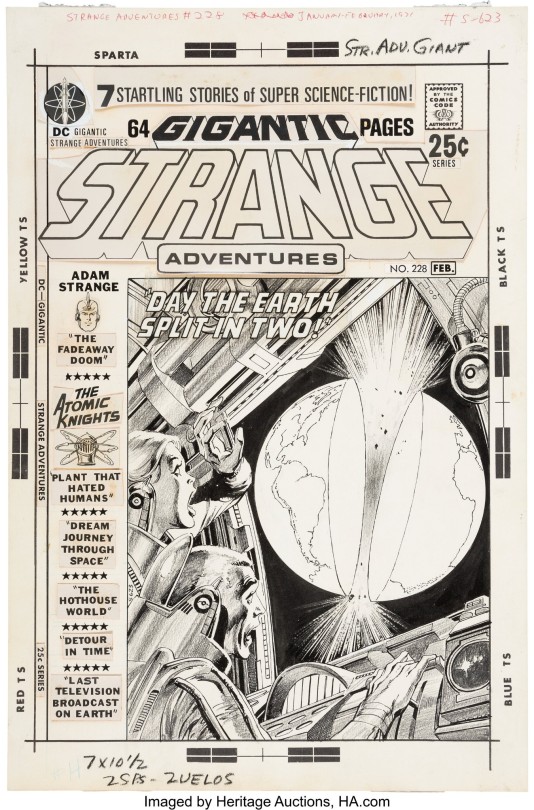
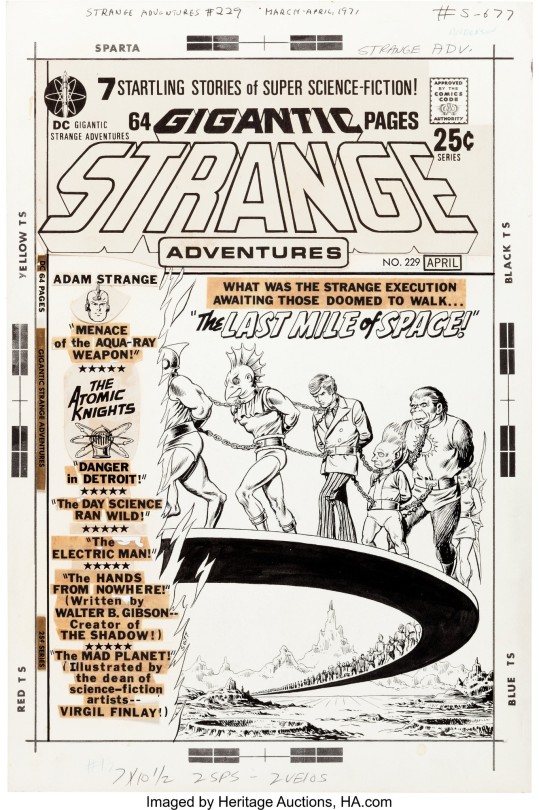
Original Art - Strange Tales (1971)
Art by Murphy Anderson / Neal Adams
#Comics#DC Comics#Strange Adventures#Murphy Anderson#Neal Adams#Science Fiction#Vintage#Art#Original Art#Adam Strange#Atomic Knights#Virgil Finlay#Walter B Gibson#Walter Gibson#1971#1970s#70s
25 notes
·
View notes
Note
In your opinion, what are The Shadow's flaws as a character?
As usual I’m gonna be mostly ignoring the ones more specific to radio/comics/etc, kinda self-explanatory at this point as to why, to focus more on the pulp version and the broader idea originated from that:
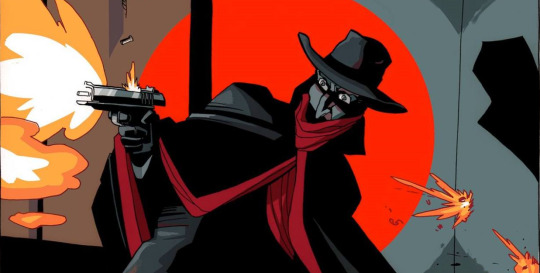
One of the more obvious ones, the one that’s part of why it's not really that unbelievable so many modern takes have twisted the character so throughly, is that he's scary. And, yeah, of course he is, we love him because he's scary and is a genius crimefighter who beats criminals at their own games and etc, it doesn't tend to come up as a intentionally-written flaw in the pulps, but sometimes it does affect the good stuff he's trying to do.
One example that comes to mind is a sequence from The Living Joss, where he rescues a guy in the nick of time from being killed and is ready to flee with him, but the guy is so terrified of everything that's been happening to him that he flees The Shadow and ends up dying by driving off a cliff. It's not really The Shadow's fault, it's not like he doesn't try to comfort the people he rescues (something that’s really missing from non-pulp adaptations is scenes where he just, talks to people as The Shadow, without demanding stuff from them), but it's not the guy's fault either, because how was he supposed to tell The Shadow wasn't out to kill him as well?
The skid of his car had pointed Goodall back along the road. Despite the fact that the rescuer in the speedster was certainly a friend, Goodall took to frenzied flight.
Before The Shadow could stop him, the frightened man shoved his car into low, and changed gears as he headed back toward the obscure crossroad on the other side of the bridge.
Blaine Goodall had died through his own frightened efforts to escape while protected by The Shadow
The biggest example that comes to mind in regards to how this approach is a double-edged sword might be found in The Third Shadow, where the premise of the story is that a petty criminal sees The Shadow in action and relates it to his partner, who’d go on to impersonate him (along with a third criminal, far smarter and more dangerous than them, that would do it better). Said criminal is inspired specifically by seeing The Shadow cornering a butler, who was secretly a murderer and serial robber who fled a criminal past in England, and intimidating him into writing a full confession and killing himself with the revolver used in his latest murder. The Shadow leaves the butler to his decision long enough for Cardona to arrive and arrest him, intervening only to knock the gun away from his hand when he tries to shoot Cardona instead, meaning he was waiting in the room unseen to see if he’d surrender or shoot himself.
Watching The Shadow in action scaring a hardened murderer into killing himself leaves said criminal “gasping like a man who had experienced an apoplectic stroke” and terrified that he’d been seen by The Shadow, is what kicks off the plot of this story, and it’s that kind of terror that unsurprisingly leads the villains of the story to figure out that said terror is an extremely effective tool to get their hands. Not the first nor the last time that Shadow villains would rip off The Shadow’s tactics, but particularly notable because of how specifically inspired they are by The Shadow’s power and terror antics.
The Third Shadow is actually one of the key stories that demonstrates how The Shadow functions morally, in that he winds up giving to this criminal and his partner (and other criminals in this story) extensive chances at redemption, and the story summarizes a cardinal rule of The Shadow with the following line:
To murderers, The Shadow dealt death: to such schemes (robbery, fraud, etc) as Corbal and Renwood, he dealt ridicule.
I wrote about this aspect earlier as well with The Radium Murders, and I’m particularly singling out The Third Shadow here because it makes for a pretty brutal contrast: this is ultimately one of the more fun Shadow stories by virtue of it’s concept, but it’s never really commented on that the central premise relies so strongly on this kinda inescapable issue with The Shadow’s approach to crimefighting and, yeah, the story starts with The Shadow coldly intimidating a man into killing himself. Even if he had it coming, it’s still pretty jarring (if you’re familiar with the pulps, that is).
He doesn’t resort to torture, not even of the “beating up criminals for information” kind. As far as I know, Gibson only wrote one instance of on-screen torture in Death Token, where he has to extract information from a guy who tried to stab him, and so he strangles the guy, allows just enough air to enter his lungs, and then reapplies pressure if he doesn’t talk, and he does this till the guy talks. This method is only used again in The Crystal Buddha. It’s grisly and horrible and part of the larger problem with urban vigilantes resorting to torture, and pretty much all of them do it to the point dangling people over rooftops is considered grandfathered in. I bring it up specifically because The Shadow doesn’t do that, and doesn’t usually have to do that, so naturally when he does it, it sticks out as uniquely horrible.
I've mentioned this in a post where I talked about a crossover idea with Superman, but sometimes The Shadow can be petty in ways that are pretty undignified, which is nearly always played for laughs. I shared in that post a sequence from Book of Death where the narration states that The Shadow's pursuing a man who knocked him out earlier in the story with the intent of paying him back and in a way that would "still allow him to retain his senses, thereby appreciating the fact that he had been outguessed". It's funny, yeah, but it's not exactly the most flattering description.
Likewise, there's a pretty funny sequence in The Shadow's Rival that describes The Shadow being stuck in a hiding spot after the police plucked a group of criminals before he could get to them, after a string of successes lately thanks to the help of a new character, and the narration outright describes The Shadow "would rather be circled by a squad of aiming killers than found like a skeleton in a closet", and that passage also describes him as being pretty frustrated over being rendered useless. Additionally there's also this part right after:
"Ganner Seard a man whose debut as a crime−solver had accomplished remarkable results. In a sense, he was The Shadow's rival. That thought was spurring The Shadow onward to new action. Before this night was ended, The Shadow intended to gain an important goal before it was uncovered by Gannet Seard."
And there’s no two ways about it: it is played up as more as a gentlemen’s rivalry, but that is The Shadow being jealous of someone. And it's not inconsistent with some other scenes where The Shadow acts in ways that are undignified and petty, moments that hardly ever register or are talked about because of how uncharacteristic they are. And they are to an extent, but they happened.
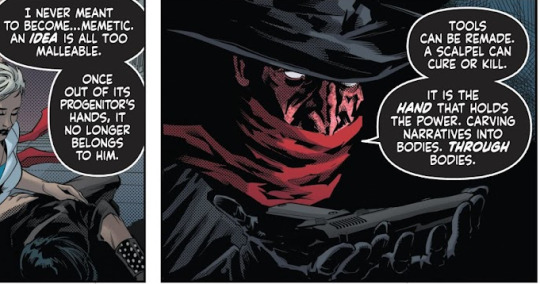
He also shot a guy in the back in The Crystal Buddha. Not one of his better days, that one.
Within the pulps, he’s easily at his worst when Theodore Tinsley writes him. Tinsley’s Shadow is notorious for running on hotter fumes: he gets emotional more easily, he acts more rashly, he gets wounded more easily and frequently and less-urgently than Gibson’s version, the stories have way more torture and more sex and murder and that kind of stuff. Some people are into it, others aren’t, I like parts of it but mostly I’m not. And one of said differences is that Tinsley’s Shadow is more willing to resort to torture, most notoriously in the Prince of Evil saga, where we learn The Shadow built a lab specifically for the purpose of extracting information from criminals through bloodless sensory torture, where he straps criminals into a room and submits them to varying degrees of sonic frequencies and strobe lighting until they talk. He ends up eating shit over it at the end of that saga because the villain hijacks the controls, so The Shadow winds up having to go into the torture room and endure it to stop the man he’s holding captive from dying or being permanently scarred.
Tinsley really, really liked to overdo it on the torture scenes for his villains and that bled over to him giving The Shadow a willingness to torture that didn’t exist under Gibson, and The Prince of Evil saga is notorious for pushing The Shadow to extremes, including the first and only cliffhanger in the series with the kidnapping and horrific torture of Rutledge Mann: Obviously nothing justifies the existence of this torture room, but there is a precedent in the series for desperate circumstances and harsh failures and misery befalling his agents forcing The Shadow to resort to more extreme measures, that eventually backfire and force him to step back a bit.
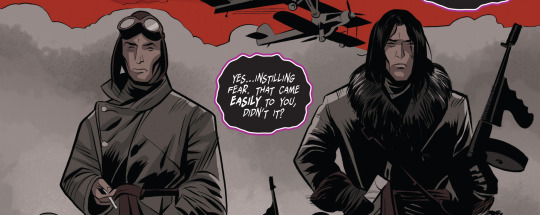
I mentioned this in regards to the prospect of him dying, but he’s been described canonically as a thrill-seeker, a daredevil, someone who welcomes danger and laughs enthusiastically and genuinely in the face of it. His lack of self-preservation is often one of his most heroic traits, but in reality, it is an aspect that comes with downsides as well. There’s that part in his backstory where he relays, “aviation offered part of the life I needed; but it provided neither the action of battle, nor the keen work of the secret agent". “Part of the life I needed”.
The Shadow’s Rival touches on this a bit in that segment, where The Shadow thinks of law enforcement being able to pick up his slack as his cue to retire or find another place to go, a prospect that deep down, he finds disconcerting. It’s at once a rather telling display that his go-to thought when faced with the prospect of being made redundant isn’t bitterness towards whoever’s replacing him, but unease towards his own prospects of having to retire or leave.
That this briefest and most exclusive glimpse at a very basic human desire to be needed is included here as a flaw, is telling of the kind of character that The Shadow presents himself as, an unassailable force of nature. It is strangely easier to imagine character flaws for this figure taking the form of superpowered dark sides or vicious pasts enacting bloody rampages on horseback or airplane, than anything as petty or simple or human as not wanting to be embarassed or getting jealous at someone or even having “wants” in the first place.
Inavertedly I also think this brings up an interesting tension: That he knows he shouldn’t be needed, but he doesn’t want to be unnecessary. He knows his life is led by grim necessity, but it’s a life he “needs” on some level. He rejected the idea of being a mercenary because he finds warfare a disgusting and uncivilized blight on humanity only made useful under absolute necessity: but life after warfare left him restless and without purpose. He doesn’t laugh all the time purely or even mostly for the sake of psychological warfare. He enjoys combat and danger, and if he deals death to murderers during it, no skin off his back when he’s only returning their evil against them.
It’s in the pitch he gives to Harry Vincent in the first book: “life, with enjoyment, with danger, with excitement, and above all, with honor" (and with money, but that one clearly means nothing to him). He cannot stand danger upon innocents, but cackles with joy at the prospect of throwing himself into the meat grinder for the sake of something. He operates under his own rules and code of honor, but he’s still embroiled in warfare. And I’m stopping short of arguing that The Shadow is suicidal because I think that’s a stretch too far but, unshakeable confidence only goes so far in his line of work.
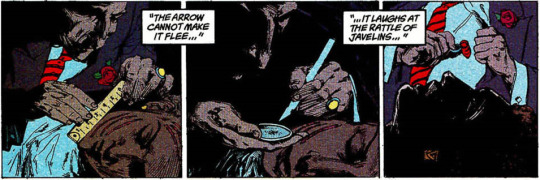
If I was going to try to name one central flaw, of sorts, a conceit in which these others can be born or can be understood through, I would say it’s detachment of personhood. In the sense that, it’s that same distance from personhood he has that defines him as The Shadow, that lets him operate the way he does and do all that he does, that also creates such room for all of these traits to be made sour. The Shadow keeps everyone and everything at arms length, the agents and the audience alike, he is perceived only through prisms and smokes and masks that he constructs and are constructed around him, and any perception can curdle up and take dark turns.
His honesty and commitment to the truth can be an insensitive fanaticism with conforming reality to his own truth. His persuasive charisma and interpersonal intelligence becomes manipulative puppeteering. His unshakeable confidence becomes unassailable arrogance, and The Shadow Knows becomes less reassuring certainty and more audacious egotism. Devotion turns to obsession, truthful and stern characterization turns cruel and cold, and any personal insecurity or slight or stain adds up. There is no quality a person can have that cannot become something sour and toxic, and this should be first and foremost a warning, an inescapable facet of personhood.
The Shadow is not a person, The Shadow cannot be a person, but The Shadow is a person. There is no Clark Kent or Bruce Wayne or Peter Parker to divide or ground or define him in easily relatable or understood traits of personhood, there is only The Shadow and whatever role he has to play, whatever you construct piecemeal about him or choose not to.
The Shadow is an unassailable all-knowing force of nature whose eyes burn with certainty as he commands thunderous and lethal judgement over mankind. He is also a deeply eccentric, overdramatic man with a deep love for theatrics, compassionate and ridiculous and thoughtful and prideful and disturbing in varying degrees. He is not pretending to be one or the other. He is what he is, even when he is wrong, even when he veers too close to being monstrous.
He is too big, too grandiose, too fantastical, to not contradict himself in said multitudes. His humanity, his heart even, is kept at arms’s length, but it is there nonetheless, and with all that entails. Few things are more human than going through drastic lengths to be anything but.
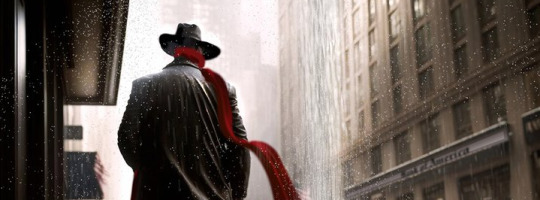
#replies tag#the shadow#pulp heroes#pulp magazines#shadow magazine#shadow pulps#kent allard#lamont cranston#couldn't let the year end without another big shadow piece#walter gibson#theodore tinsley
54 notes
·
View notes
Photo
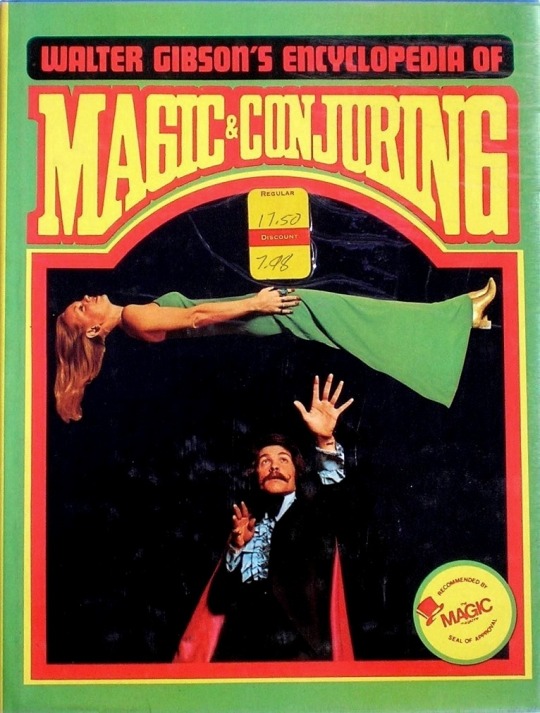
Walter Gibson's Encyclopedia of Magic & Conjuring - Drake - 1976
#witch's#conjurers#occult#vintage#encyclopedias#magic & conjuring#drake books#walter gibson#walter b. gibson#walter brown gibson#1976#ecyclopedia of magic & conjuring
40 notes
·
View notes
Text


Drew this back in January when I tried my hand at drawing World War II plane insignias for a co-worker who has a cool interest in airplanes, namely the ones flown by the Tuskegee Airmen. I've had this idea in my head after my recent obsession over The Shadow radio drama and pulps. I've always wondered what it would look like if there was an emblem that one of his agents would use on various weaponry.
I definitely need to use these on some graphic apparel when I'm able to print some.
Stay tuned, folks!!

#jay's art#fanart#ink#color#jay's post#digital art#graphic design#pulp#the shadow#lamont cranston#black eagle#wwii era#insignia#logo#cartoon#radio drama#dynamite entertainment#photoshop#gift#walter b. gibson#walter gibson
3 notes
·
View notes
Text

3 notes
·
View notes
Text




JOHN CUSACK as Walter "Gib" Gibson
The Sure Thing (1985) | dir. Rob Reiner
#john cusack#80s films#the sure thing#walter gibson#rob reiner#the first photo is... omg i can't breathe#mine
16 notes
·
View notes
Text
"That boisterous group at the other end are more serious than they look. They're all editors of magical magazines: Al Plough of the Linking Ring, Walt Gibson of Conjurors', Mel Melson of Tops and Bill Sachs, who handles the magic column in the Billboard.
-#323: The Magigals Mystery
cheeky little cameo, there, mister Grant
2 notes
·
View notes
Text
Making fiction from family memories – Charlie Young
‘I realised I came from an unusual family,’ says Charlie Young, and in that moment came another realisation – there was a story to be uncovered and told. That story became a historical novel, Houdini’s Last Handcuffs, co-written with his sister Cheryl.
But to begin at the beginning, I asked Charlie where the idea of the novel was born.
The idea of Houdini’s Last Handcuffs came from a multitude…
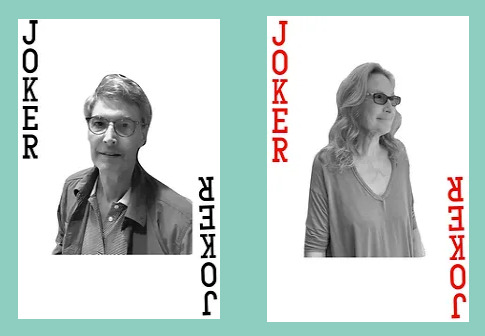
View On WordPress
#Charlie Young#Cheryl Young#childhood#co-writing a book#fiction from childhood#Harry Houdini#historical fiction#Houdini&039;s Last Handcuffs#interview#interviews#magic#making fiction out of fact#using real people in fiction#Vine Leaves Press#Walter Gibson#writing from memories#writing from real life
0 notes
Text
Dark Horse and Yoe Books Announces "Space Western Comics: Cowboys vs. Aliens, Commies, Dinosaurs, and Nazis!"

Dark Horse And Yoe Books' Space Western Comics: Cowboys vs. Aliens, Commies, Dinosaurs, and Nazis! collects the six issue Space Western Comics series into one trade paperback. The 1950's series was written by Walter Gibson with art by John Belfi, Stan Campbell, and Lou Morales. The collection also features an illustrated introduction by Craig Yoe as well as a "lost" story.
"Spurs Jackson and his Space Vigilantes bravely defended the frontier against commies from Mars, Venusian spies, Meteor Men, moon bats, and of course, Hitler and his space Nazis. Oh, and dinosaurs!" (Dark Horse)
Space Western Comics: Cowboys vs. Aliens, Commies, Dinosaurs, and Nazis! trade paperback goes on sale in bookstores on September 17, 2024, and in comic shops on September 18, 2024.
(Image via Dark Horse - John Belfi's Cover of Space Western Comics: Cowboys vs. Aliens, Commies, Dinosaurs, and Nazis!)
#space western comics#space western#walter gibson#john belfi#stan campbell#lou morales#craig yoe#dark horse#yoe books#TGCLiz
0 notes
Text
It's an intergalactic ride with Space Western Comics: Cowboys vs. Aliens, Commies, Dinosaurs, and Nazis!
It's an intergalactic ride with Space Western Comics: Cowboys vs. Aliens, Commies, Dinosaurs, and Nazis! #comics #comicbooks #graphicnovel
Dark Horse Books and Yoe Books present Space Western Comics: Cowboys vs. Aliens, Commies, Dinosaurs, and Nazis! All the cowboy/sci-fi mashup stories from the bizarro six issue series are combined in one wacky trade paperback. The series is written by Walter Gibson with art by John Belfi, Stan Campbell, and Lou Morales.
Welcome to the wild, WILD West! Spurs Jackson and his Space Vigilantes…

View On WordPress
#dark horse#dark horse books#graphic novel#graphic novels#john belfi#lou morales#space western comics#stan campbell#walter gibson#yoe books
0 notes
Link
Just added to the Vintage shop!
~ “The Complete Illustrated Book of the Psychic Sciences” by Walter Gibson and Litzka Gibson (1966)
#The Complete Illustrated Book of the psychic sciences#Psychic Sciences#Walter Gibson#Litzka Gibson#VintageCDChyld#Vintage Etsy#Vintage Books#Vintage Etsy Seller#Etsy Seller
0 notes
Text
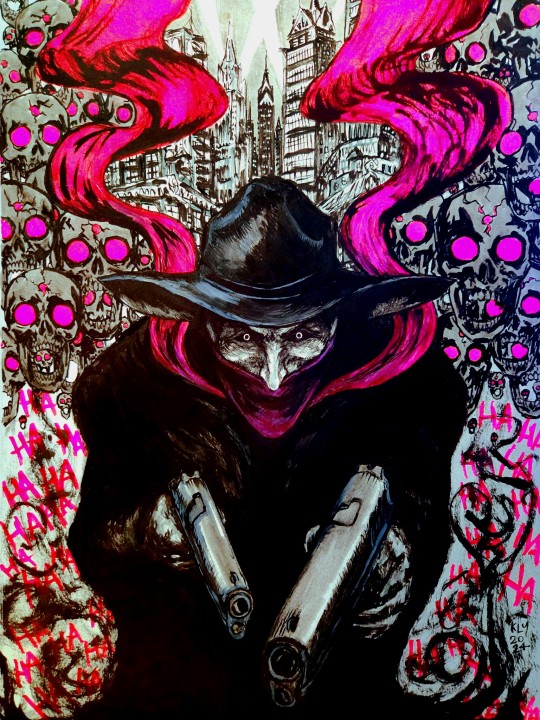
ᴡʜᴏ ᴋɴᴏᴡꜱ ᴡʜᴀᴛ ᴇᴠɪʟ ʟᴜʀᴋꜱ ɪɴ ᴛʜᴇ ʜᴇᴀʀᴛꜱ ᴏꜰ ᴍᴇɴ?
ᴛʜᴇ ꜱʜᴀᴅᴏᴡ ᴋɴᴏᴡꜱ!
48 notes
·
View notes
Photo
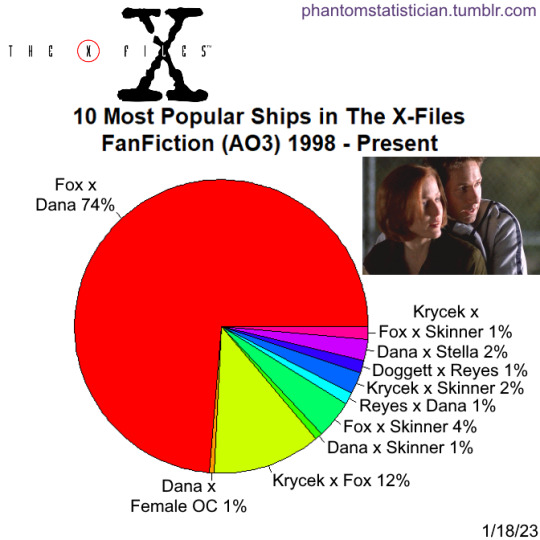
Fandom: The X-Files
Sample Size: 17,626 stories
Source: AO3
#fox mulder#dana scully#alex krycek#walter skinner#stella gibson#john doggett#monica reyes#the x-files#x-files#fanfiction#ao3#statistics#phantom statistician#msr#mulder/scully#the mothership
322 notes
·
View notes
Text

A sombre shot of Sam Reid and John Leary as Dale Jennings and Murray Gallagher from No More Lies, as well as some others ❤️
.
.


Next Thursday, it will have been three years since No More Lies first went to air on the ABC. It’s a funny feeling, seeing all these Season One episodes reach their third year anniversaries, as I have such strong vivid memories of watching this show as it first aired, whilst we were in lockdown. It truly doesn’t feel like that long ago, but according to time and mathematics, it is.


No More Lies really did strike a nerve. It’s brilliantly brave and searing storytelling around the plight of HIV and AIDS affected people and how the media represented - or rather, misrepresented - their stories and circumstances. This is why I love The Newsreader so dearly. It hasn’t portrayed the 1980s through rose-coloured glasses, and has sought to elevate the stories and perspectives that were either misrepresented or not represented at all during the time. It also demonstrates how easy it is to fall for misinformation, and I genuinely believe that this episode is a great lesson in media literacy. The whole show itself, but in particular this episode, should be used in schools and universities.


A part of my paternal family history is my Dad’s younger brother, who was a young gay man who contracted HIV during the 1990s. This was the decade in which medical treatment and antiretroviral therapies became available to significantly prolong the progression of the virus to AIDS in HIV-affected patients. He was thankfully able to benefit from these therapies and medications, which bought him two decades of life, longer than our Russ and Caroline would have lived for.


We sadly lost my paternal uncle Christmas 2012, when he was only forty years old. Through watching this episode with my Dad, it gave me the courage and the instigator for a discussion about my uncle’s condition, how people responded to it, and how it impacted his life. I’ll forever be grateful to No More Lies, and especially to Michael Lucas and Kim Ho, for giving me the opportunity to have this discussion with my Dad, which I had been hesitant to have for at that point nine years. Never underestimate the power of good media and the conversations and connections it can bring about. 💖🌟
#dale jennings#sam reid#murray gallagher#john leary#helen norville#anna torv#noelene kim#michelle lim davidson#adam lindell#tim draxl#russ the newsreader#geoff walters#robert taylor#rob rickards#stephen peacocke#caroline gibson#alexandra schepisi#the newsreader#nas1986 s1 story a day
9 notes
·
View notes
Text

56 notes
·
View notes